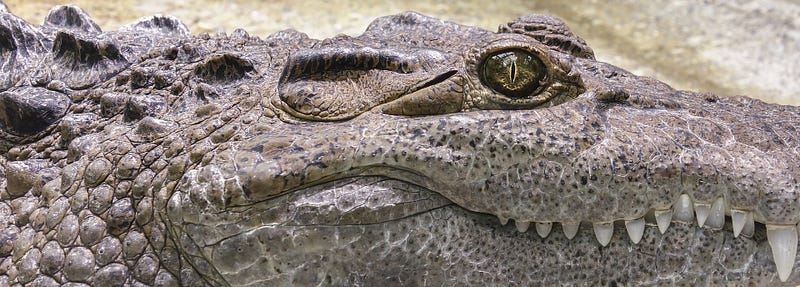One of the Most Terrifying Predators You Know Used to be a Vegetarian
By Kristina Klosowski, Behavioral Neuroscience, 2021

The crocodile is one of the oldest creatures on the planet. For over 200 million years they have roamed the earth, surviving mass extinctions and outliving the dinosaurs. With their eerie ability to lay motionless in the water, eyes built uniquely for lurking, and a toothy grin to send chills down your spine, these animals do look a bit like they’ve lumbered out of an ancient horror film. Few other animals truly boast an appearance as downright terrifying as a crocodile.
However, despite their current status as fierce, meat-eating predators, certain periods in history knew a much different animal. As it turns out, throughout their evolutionary history, they have repeatedly evolved to favor a surprising diet: a plant-based one. While it seems quite contradictory to picture a vegetarian croc, science tells us that this happened not once or twice, but possibly up to six different times.
Throughout their evolutionary history, crocodiles have repeatedly evolved to favor a surprising diet: a plant-based one.
When scientists began studying the details of their terrifying toothy grins, they found that crocodile teeth were not always sharp, pointy, and designed for chomping prey as they are today. Some had flatter teeth with bumps and grooves, characteristic of teeth used for grinding and chewing plant material. In fact, it is inferred that ancient crocs had an incredibly varied diet, some being omnivorous and some preferring primarily plant-based diets. Fossil evidence indicates that these herbivorous creatures roamed the earth during the Jurassic period. Interestingly, this was the same period of time during which herbivorous dinosaurs thrived as well.
From this, an obvious question is posed: If crocodiles with a wide variety of diets were able to thrive millions of years ago, why not today? There are ongoing research efforts to further examine this. But for now it seems we will have to settle for living side-by-side with some of the fiercest hunters on earth, as we try to avoid the murky waters where the crocs roam.
